Vaihayasi Pande Daniel in Mumbai
Do you realise how lucky you are? That is one question Sharan Arasa, 28, who owns Hotel Arasa, a popular restaurant serving Udipi food in Andheri, northwest Mumbai, is rather weary of answering. Or acknowledging.
Of course, he knows bloody well how lucky he is!
Sharan was probably the only person to come away alive after encountering Ajmal Kasab and Abu Ismail that fateful November night. He met the killers at Nariman Point, south Mumbai, when they stole his brand new silver Skoda Laura to make a getaway down Marine Drive.
Why didn't Kasab kill him? Another question that Sharan has pondered over a thousand times since.
He says thoughtfully, "The only logical explanation I have come up with is that probably they did realise there were cops all around the area. (Kasab) did not want to attract any more attention by shooting and making noise. Had they (been able to leave) that (stolen police jeep) there and run off in my car -- and we had not informed anybody about it -- they could have just got away and the cops would have never known. No other reason. They shot every person who came their way. I cannot come up with any other logical reason other than this."
Sharan still drives the same Skoda he drove before 26/11
Image: The Taj Hotel on fire during the attackNumerous press interviews and people perpetually asking him for the tale of his escape makes his attempts sometimes uphill. It is difficult for someone as reserved as him, he says, to be constantly in the news for a simple decision of geography taken 400 odd days ago that changed his life.
He believes that the band of terrorists that came from Pakistan to attack Mumbai, arrived here with the purpose of driving fear into the hearts of Indians. And if fear has indeed entered his heart, then the terrorists have won the battle. That is one battle Sharan will not lose.
So today Sharan still drives the same Skoda he drove before 26/11 after he got it back from the Mumbai police's crime branch a year ago, repaired it and painted it white to prevent recognition and follows the same routine, dividing time between work and friends, and helping his father Ramesh Arasa manage Hotel Arasa, often working late into the night.
It is tiresome that often when he is sitting at the restaurant managing the counter, patrons will suddenly recognise who he is and start talking about him. Suddenly necks will swivel 180 degrees to look at him. "I get angry and get up and go into the kitchen."
Ever since Sharan got back on the road in his favourite Skoda, which actually belongs to his dad, and is even more precious for both of them, he feels 26/11 and that horrible, unbelievable night at Nariman Point haunt him less. But Mumbai's terror attacks, he says, has left him a more mature, cool person, less prone to hotheaded action.
'I assumed he was a cop, he had a gun'
Image: The Skoda with Kasab and Ismail was stopped by the police at Girgaum, south Mumbai"I was at home (on 26/11). I got a call that something was happening at the Oberoi (hotel). On the news there were unconfirmed reports of firing taking place, but they weren't sure what exactly had (occurred). It so happened that one of my very close friends worked at the Oberoi (Sharan is a graduate of the Aurangabad hotel management school and his friend was a batchmate). We called him and he wasn't picking up his phone. We were panicking.
Then he called us back, of course, (to tell us) that he is fine and had already been evacuated from the hotel. He was working at the front office that day. He told me he had already been moved out. So my friend and I decided to go and pick him up.
I first picked up my friend, whose wife was with him, and we headed to town. We didn't take the Marine Drive road -- we heard there were a lot of cops so we thought we might as well avoid it because they might not allow us through -- so we took a road from behind. I was behind the wheel.
As we were going towards Mantralaya and Inox (a multiplex cinema in Nariman Point) these guys (Kasab and Ismail) came in a police Qualis (jeep) from the opposite side.
We didn't figure out what was happening. They just asked us to stop. My window was down. I did see a tyre that was burst. I knew the tyre was out.
(The situation) looked a little odd to me but I didn't really think about it. It was a police Qualis, they were in it and it was still moving. They screamed loudly in Hindi. The first guy got out of the car. I didn't have a very good look at him but he was wearing a green jacket. I assumed he was a cop and he had a gun. Something was happening in this area and there would still be cops around (I knew).
'... Kasab put a gun to my head'
Image: Policemen stop the cornered SkodaThis was right near, if I am not mistaken, Maker Chambers. Not sure exactly, because I hardly go that side (to south Mumbai). One reason why people found it hard to believe it was me (that night at Nariman Point) is because I never got to town, really have no work there.
He opened the door, caught me by my collar, and pulled me out. As soon as he pulled me out of the car, he sat in the car. I realised something was wrong. I looked across at my friend and we saw the other guy sitting in the car from the opposite side. The guy who yanked me out was Ismail. Kasab sat in the passenger seat.
I (moved) behind the car and my friends went to the footpath (sidewalk). I was standing behind the car when I realised that unconsciously I had taken the keys in my hand. When I get out of the car I always take the keys so probably when he asked me to get out, I took the keys.
Something else is happening. We knew there was a shootout, we knew there were people in the area, but we never knew they were terrorists. We did not know at that point about the damage they had caused to the CST (Chhattrapati Shivaji Terminus railway station). We had not known any of that. We just knew there was some gang war happening outside the Taj (Mahal Hotel and Palace) and The Oberoi (and Trident).
My first reaction was obviously to throw the keys away. I didn't throw them at him. I threw them down on the ground. The keys happened to go under the car and I moved two feet behind. That was when these guys realised there were no keys in the car. Kasab came out from the passenger side and he asked me where the car keys were. I said they were below the car.
He said, 'Give them to me'. So I bent down and gave him the keys in his hands. And they took the keys and went off. They spoke in Hindi. Basically Hindi but what they exactly said I didn't (follow). (He spoke) kind of menacing. When I was picking up the keys, Kasab put a gun to my head. Probably just in case I tried something funny he would shoot. They just took off after that.
'If you put your hand in your pocket I will shoot you'
Image: Police officers check the Skoda after the encounterPhotographs: Uttam Ghosh
I realised from the way they were speaking that they were not from around here. I assumed they had come from outside -- turf war, gang war, whatever it was, because of their accent, the way they spoke. They did not seem from Mumbai, not even from Maharashtra.
Kasab had a backpack. I do remember Ismail's face but not as clearly as I remember Kasab's face. My interaction with Kasab was slightly longer because he asked for the keys and I looked at his face and I bent down to get the keys and when I got up to give him the keys I again looked at his face.
They seemed pretty alert, not doped. They drove off and went around the bend and the cops came from the other side like a typical Hindi movie scene. As soon as we left we saw the cops coming around from the back.
We told the cops that two guys came and have taken our car. I gave them the car number, the make, the registration number immediately and they got it out on the wireless and they left.
The cops (when they reached us were) themselves were trying to figure out what was happening. As soon as they came they asked us to lie down on the ground. Unfortunately my phone started ringing so I (started) to put my hand in my pocket to pick it up. 'If you put your hand in your pocket I will shoot you,' (they told us). So we kept quiet.
There were 15 or 20 cops. They came in one big van and two small jeeps. I was cursing the person who called me. I don't blame the cops. They were unsure who the people were who were involved and how many people were involved.
The police asked us to come slowly (to them) and they asked us to walk backwards, backs to them, hands in the air.
I was praying that I hope these people will not shoot me just to prove they shot someone thinking it was a terrorist. That was the biggest scare at the time. It now sounds pretty funny.
'We paid the cabbie three times the fare to go home'
Image: The media jostles to get a shot of the shattered SkodaPhotographs: Uttam Ghosh
(Afterwards) we were just sitting. There is a kind of garden there and that was when we heard an explosion in the Oberoi. We thought we better just move out of there and we will see what happens later. Someone told us the MLA hostel is around there and 'Why don't you go and sit there?'
When we were walking we heard this explosion in the Oberoi, probably a grenade went off. We took a cab immediately -- we did get a cab, we offered to pay him three times the fare and that was the only way he agreed to take us back.
That was when I got a call from my friend. I told him I didn't want to talk to him about it right now. We were pretty shocked. Scared. They asked where we were planning to go. So I said I was dropping my friend and going home. They said: 'Don't go home because there is a shootout happening at the Mariott and at Juhu (both in northwest Mumbai; no such incident occurred)also'. So I said we would stay at my friend's house (in Mahim, northcentral Mumbai).
When we switched on the TV that was when they started flashing that these three cops (Hemant Karkare, Ashok Kamte and Vijay Salaskar) had been killed.
We switched channels and they were flashing that two of the guys had been arrested, who were in a Skoda. When they showed the car I realised it was my car!
That was when I realised that I had not informed the cops. I immediately went to the Mahim police station. I told them what had happened. Initially they were very hesitant about taking the statement. We were really pretty nervous and couldn't tell them enough. Once the man in charge walked in, he calmed us down.
'My dad did not know what was happening'
Image: The shoes of a killed terrorist and a spent bullet at the spotPhotographs: Uttam Ghosh
We gave our statement and came back to the house. I called my dad and told him what happened. He was shocked. He had gotten up in the morning and realised that my room lights were still on, and was wondering why they were on so early in the morning.
He freaked out obviously. Anybody in his place would. He did not understand what had happened. I tried explaining things to him on the phone. Then he started calling my uncles and all that.
I started getting calls from everybody in the family. Obviously that was one time that I did not want to talk to anybody. I called my dad and said, 'I don't want to talk to anybody'. He said: 'Stay there, when the matter starts easing up, that's when you can come back home. Not an issue'.
By afternoon nothing much was happening around Juhu and Mahim, and that's when I took a cab and came back home. My friends too were very scared. I am lucky I had my family around me. They were just two of them and their parents in different cities (the girl's family only got to know that she had been there when she went home in January and told them).
It was difficult for them to cope. We have a very close-knit group of friends. Everybody supported us and we stuck together. And the family really supported us. (A day later to dodge the press -- reporters were at his home and restaurant by the afternoon of November 27 -- and numerous phone calls, and achieve some normalcy in his life, Sharan moved to his aunt's house for a couple of days.)
'I would never forget someone who had put a gun to my head'
Image: Kasab at the Chhattrapati Shivaji TerminusPhotographs: Kind Courtesy: Sebastian D'Souza/Mumbai Mirror
Prosecutor Ujjwal Nikam asked me questions. I answered them to my best. After that (Kasab's lawyer Abbas) Kazmi asked me some questions. His questions were illogical mostly. I don't why he was asking them. He asked me: "How many cops were there? How many cars were there? What kind of cars were there?' (Questions) which were very ridiculous according to me. That was it.
Then he asked me who the person was and three of them were standing in line and I had to point out who Kasab was. I did that. He was (immediately familiar). They asked me in court; 'How are you sure it is him?' That was when I told him I would never forget someone who had put a gun to my head. I would never forget his face.
They flashed his photograph so many times in the news that no one would actually forget his face either. But obviously I recognised the guy (even if I had not seen him in the papers) because the most shocking and first thing that came to my mind when I saw him was: 'This guy looks like a kid. How could he be involved in something like this?' I saw him with a gun (but in spite of the gun) I wondered.
He was very short. He was just five foot one or five foot two. That's about it. If you put him next to me he looks like a kid actually in front of me (Sharan is well-built and about 5'10). The other guy was much taller, probably taller than me (six feet) and an older man.
The first thought that came in my mind over there was that if this guy did not have a gun in his hands I would have probably slapped him. That is exactly why I will never forget his face. It completely shocked me that someone that young would be involved in something like that.
'One-and-a-half years to get justice?'
Image: Abbas Kazmi, left, quit as defence lawyer later. Right: Public Prosecutor Ujjwal NikamWhat really bothered me about the Kasab trial is the fact that, one, yes they spent so much money on someone -- I am paying money for someone who actually killed my fellow people.
Secondly you do agree you cannot kill the person, because you have to have a fair trial, because it is international human rights at the end of it, you can't show you are a barbaric country. You prove things through a court of law, I agree.
I just felt it went a little too long since I have personal experience of being in court. The defence lawyer just asked us ridiculous questions. I don't know what he was trying to prove because at the end he came up with his own judgment that I was not there at the place (Nariman Point from where the Skoda was taken from Sharan) at all and the cops had put me over there and had have given me a story to say.
All I asked at the end of it was how do you explain my car coming into this guy's hands? (Kazmi) did not have any answer to that. I really felt that the defence lawyer was just wasting time. Fine, you get your witnesses in, but when the defence is cross-questioning, you ask relevant question you don't ask ridiculous questions.
They asked my friend: 'How many phone calls did make that night to our friend who was at the Oberoi.' He said five. Kazmi said 'I can see nine on the sheet'. 'Fine I made nine. I can't remember how many calls I made to each person!'
Just a stupid waste of time. The judge should not have allowed that to happen. At the end you are just playing with people's feelings. I feel so much anger for this guy (Kasab) and he just took my car. I can't imagine what people who have lost family members and loved ones must be going through. One-and-a-half years to get justice? It is an open and clear case. The guy has been caught on camera, caught by people, the guy has been caught red-handed by cops. Everything was there.
'Am I the only person who got away from Kasab? Absolutely'
Image: A paramilitary trooper keeps watch during the 26/11 attacksPhotographs: Jayanta Shaw/Reuters
(At Nariman Point when the Skoda) got taken the first thing that came to my mind -- that I said to my friend -- was that my dad is going to kill me. It did not matter that two guys with guns could have actually killed us and walked away with the car. It did not matter. I said: 'My dad is going to kill me. I have lost the car and he is going to kill me!'
I was pretty scared to inform my dad -- not that terrorists almost killed me -- but that these guys took his car away.
But he was more mad about me leaving the house without informing him and doing something as stupid as this (going to south Mumbai). There were people who were fleeing from this (the 26/11 attacks). We were not even part of it. We were nowhere close to it. It was happening in another part of the city. We were safely away from it. And we went right into it. The funniest thing is that the guy at the Oberoi was the safest among all of us because he had cops standing all around him.
(The whole incident) does not haunt me anymore. It took a couple of months. Till the time I got my car and actually drove that car again, till then yes it kept haunting me. Once I started to drive that car again confidence started building up again.
I got the car a year back -- mid January. Till mid-March it was in garage. I never knew we would get the car back. I did not know what had happened to the car. I thought the car must be full of bullet holes and would never work again.
I did not want to see the car. I thought it had been really, really badly damaged Fortunately, it was only body damage. Yes, there was a lot of blood in the car.
I wanted to get rid of the car initially. I thought I would never drive the car (again).
(The terrorists) came to drive fear into the hearts of people out here. Giving into that fear would probably give them what they came to achieve. I didn't want that. I don't look at it as a car that was taken from me and that all this happened. I take it as a normal car, that I drove before, and I would drive normally otherwise.
Am I the only person who got away from Kasab? Absolutely. People keep asking me if I realise how lucky I am, I say yes I do know how lucky I am and I don't need people reminding me again and again about it. But probably five minutes after the incident if someone asked me if I knew how lucky I was I would not have understood."

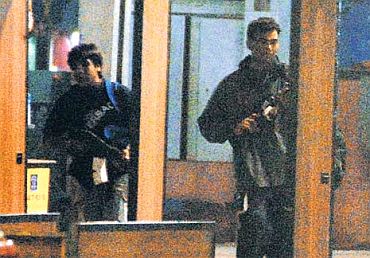
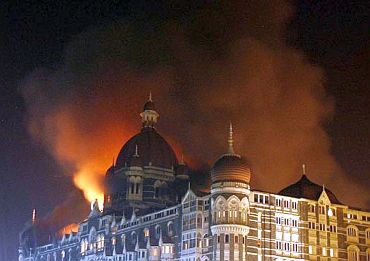
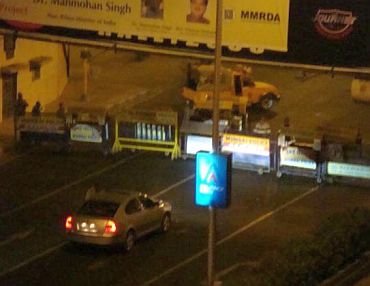
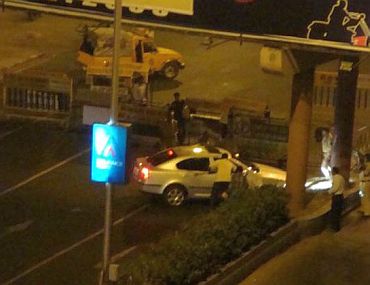
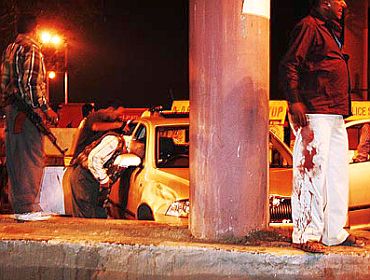
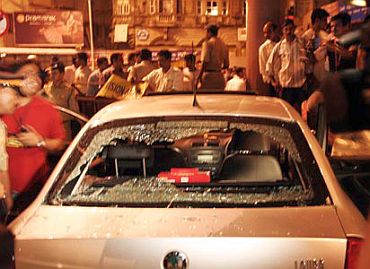
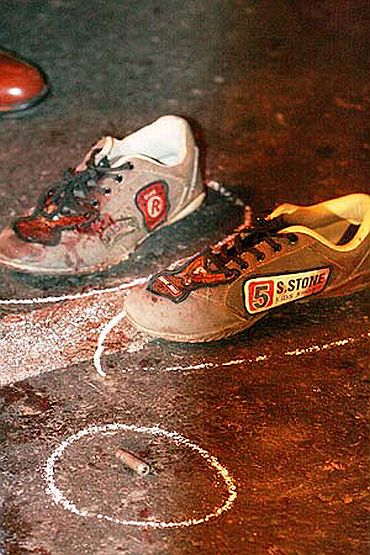
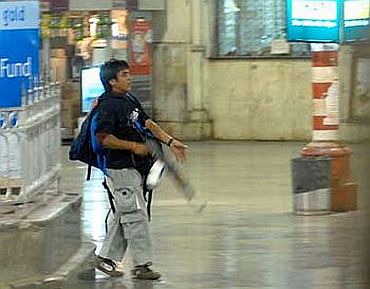
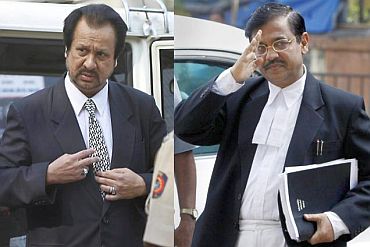

article